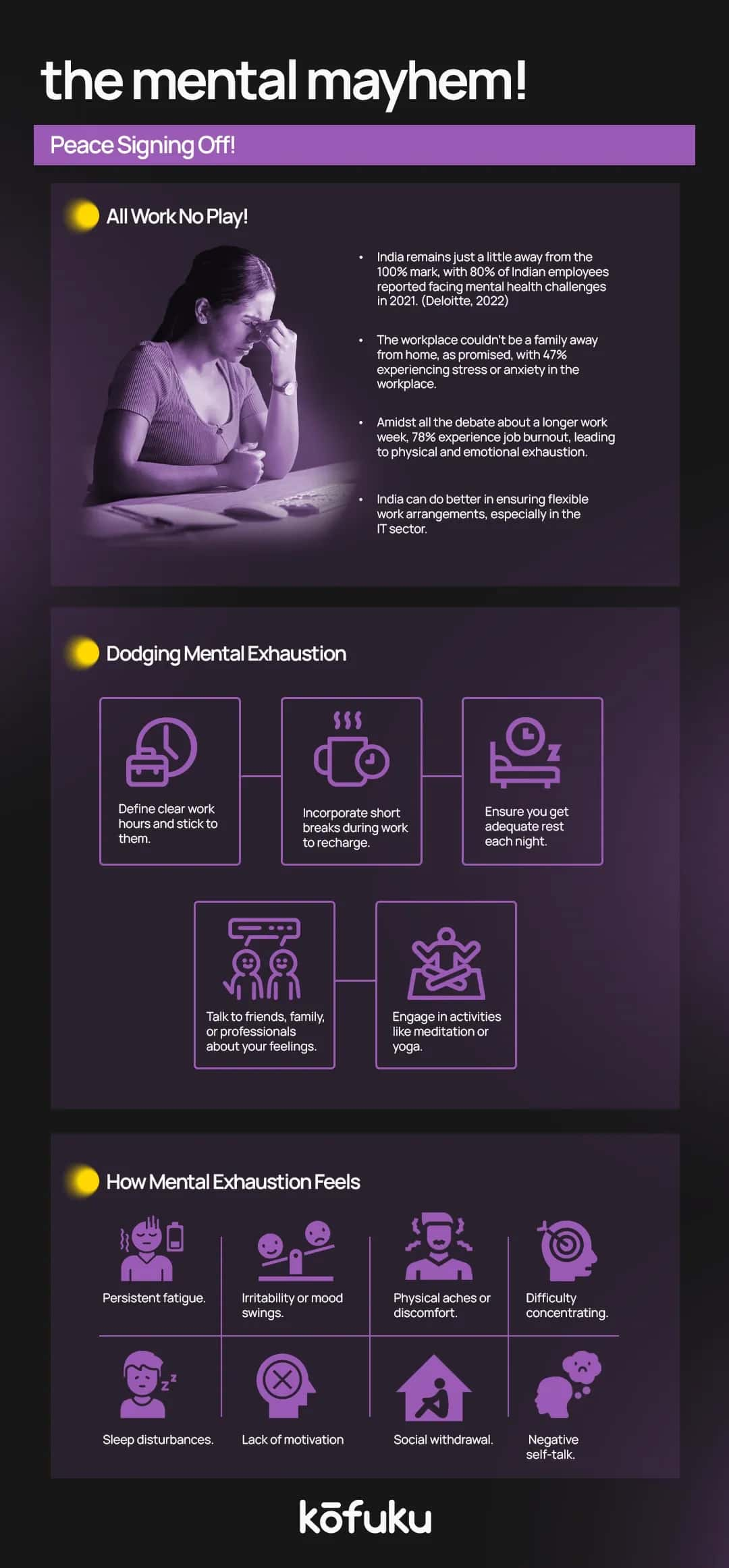Signs That You Are Mentally Exhausted

Introduction
You wake up at 6:30. Head to the gym, come home and take a shower, and by the time you get to work, you realise that’s when your day is starting. You reach home 12 hours later, and you just want to go back to bed. There’s no time for your daily chores or even going to the bank, let alone yourself.
Mental exhaustion has become a ubiquitous problem, yet it’s being overlooked in this dog-eat-dog world. Physical exhaustion can mostly be fixed with sleep and more rest, but mental exhaustion runs much deeper than that.
Close to 44% of people around the world claim that they feel mentally exhausted. But that brings to question, “What does it mean?” It is one of the most complicated emotions. When you can’t find the reason why you feel tired all the time, it's not a very pleasant feeling.
In this blog, we will explore mental exhaustion, its key symptoms, common causes, how it manifests, and ways to overcome it!
What Is Mental Exhaustion?
Mental exhaustion is a state where your cognition and emotions have hit a zero and it usually happens when your brain has been stressed for a long time. It can result from chronic stress, overwork, lack of sleep or emotional breakups.
Unlike physical exhaustion, where a good night’s sleep usually helps you feel refreshed the next day, mental exhaustion requires more deliberate and sustained efforts to recover.
Common Signs of Mental Exhaustion
Mental exhaustion manifests in different ways, affecting your thoughts, emotions, and physical well-being. Here are some common signs that indicate you may be mentally exhausted:
Continuous Fatigue and Lack of Energy
Even after a full night’s sleep, you still feel drained and unmotivated. No amount of rest seems to bring you back to your usual energy levels, making it difficult to concentrate or complete daily tasks.
Difficulty In Concentrating and Brain Fog
Mental exhaustion makes it hard to focus, process information, or make decisions. You may find yourself forgetting things easily or struggling to complete tasks that once felt simple.
Irritability and Mood Swings
Even small inconveniences like driving over that usual pothole can now trigger you and make you feel angry. Mood swings become a part of life, and you will feel emotionally drained.
Lack of Motivation
Tasks that once excited you like making a protein shake now feels like a burden. Whether it’s work, hobbies, or personal projects, mental exhaustion sucks your soul and your motivation like a death eater and makes everything feel like a chore.
More Anxiety and Stress
Mentally exhausted people many a times experience extra stress and anxiety. You may feel on edge, overwhelmed, or constantly worried about things beyond your control.
Sleep Disturbances
Mental exhaustion can lead to either excessive sleep or even insomnia. Despite feeling tired, your mind races at night like a Vegas Grand Prix, making it difficult to get restful sleep.
Physical Symptoms
Mental exhaustion can be physical too. Some symptoms are headaches, muscle tension, digestive issues, and frequent illnesses due to a weakened immune system.
Feeling Detached or Emotionally Numb
A sense of emotional detachment is common among those who are mentally exhausted and you could feel disconnected from your surroundings, relationships, or even your own emotions.
Procrastination and Decreased Productivity
Tasks pile up as you struggle to find the energy or focus to complete them. Deadlines become overwhelming, and procrastination is the normal coping mechanism.
Social Withdrawal
Interacting with others feels more exhausting than it is, leading you to avoid social gatherings, conversations, or even ghosting your friends and family.

Common Causes of Mental Exhaustion
To find mental exhaustion, you should first understand the root cause. Here are some of the most common contributors:
Chronic Work Stress
Even though we’re used to our bosses hounding us, long hours, high expectations, and a demanding work environment can leave you mentally drained. This causes a lack of work-life balance which contributes more to exhaustion.
Emotional Overload
Constantly dealing with emotional challenges, whether it’s personal or professional can take a toll on your mental well-being. Taking care of your aging parents, going through a rocky relationship, or worrying about your job all play a big role.
Perfectionism and Overcommitment
Trying to meet unrealistic expectations or taking on too many responsibilities at once because you find it hard to say no almost always leads to burnout. The pressure to be perfect in everything you do is mentally exhausting.
Lack of Rest and Downtime
Pushing yourself without allowing time to rest and recharge can quickly lead to mental exhaustion and as you continuously stimulate yourself, such as binging Succession and scrolling through Instagram all day can also tip you over the edge.
Unresolved Trauma or Emotional Stress
Past trauma, ongoing personal struggles, or suppressed emotions can make you feel constantly mentally exhausted too.
Poor Lifestyle Habits
Too much Swiggy, barely exercising, and drinking Sting instead of water can make it harder for your body and mind to function properly, contributing to exhaustion.

How to Recover from Mental Exhaustion
If you recognise any of these signs in yourself, remember to take action now before your mental exhaustion becomes a full-blown burnout. Here are some ways you can take control of it:
Prioritise Rest and Sleep
Make sure you get at least 7-9 hours of quality sleep every night. Establish a bedtime routine that makes you feel relaxed, such as reading or meditating before bed.
Set Boundaries
Learn to say no to tasks if your hands are full. Establish clear work-life boundaries to prevent overexertion.
Take Breaks and Unplug
Step away from work, screens, and stressors regularly. Short breaks during the day and longer vacations can help reset your mental state.
Get Moving
Exercise releases endorphins, which improve mood and reduce stress. Even a short daily walk can make a significant difference.
Practice Mindfulness and Relaxation Techniques
Mindfulness meditation, deep breathing, and yoga can help calm the mind and alleviate stress. Here's a quick rundown on what you can do!
Reconnect with What Brings You Joy
Bring out your inner Eat Pray, Love and take part in your favourite hobbies, spend time with loved ones, and do activities that bring you fulfilment.
Maintain a Healthy Diet
Fuel your body with nutritious foods that support brain function, including fruits, vegetables, lean proteins, and healthy fats.
Seek Support
Talk to your friend, family, or even a therapist if you want to. Expressing your feelings can visualise your problems and someone else’s perspective can make all the difference.
Re-evaluate Your Priorities
If your workload or personal responsibilities are overwhelming, consider reorganizing your priorities and delegating tasks where possible.
Limit Caffeine and Alcohol Consumption
Many studies have shown the correlation between excessive caffeine and increased anxiety. Alcohol on the other hand can disrupt sleep patterns and worsen mood swings. At the end of the day, moderation is key.
Conclusion
Not just in India, but many people across the globe feel mentally exhausted. And with 8 billion people, are we really alone?
The key is to recognise the signs early and take proactive steps to stop it in its tracks. Remember, taking care of your mind is just as important as taking care of your body. So if you feel overwhelmed, it’s okay to take a step back, improvise, adapt, and overcome.
FAQs
Q. What is the difference between mental exhaustion and burnout?
A. Mental exhaustion is often a precursor to burnout. It refers to ongoing fatigue, emotional overwhelm, and lack of focus due to prolonged stress. Burnout, on the other hand, is a more chronic state that includes emotional depletion, detachment from work or responsibilities, and a reduced sense of accomplishment.
Q. Can mental exhaustion affect physical health?
A. If your mind feels worse, can your body be far behind? Mental exhaustion will manifest physically and you will definitely see the signs.
Q. How long does it take to recover from mental exhaustion?
A. Recovery time varies depending on the severity and causes of the exhaustion. Some people may feel better in a few days with rest and self-care, while others may need weeks or even months.
Q. When should I seek professional help for mental exhaustion?
A. If your symptoms persist despite self-care, interfere with your daily functioning, or escalate into depression or anxiety, it's important to consult a mental health professional.
Q. Can lifestyle changes alone fix mental exhaustion?
A. In many cases, yes—especially if caught early. Improving sleep habits, eating well, exercising, setting boundaries, and practicing mindfulness can significantly reduce mental fatigue.


10 Effective Ways to Reduce Stress

Art Imitates Life – Mental Health in Movies

Stress vs. Anxiety - How to Tell the Difference?

Why You’re Always Tired: Uncovering the Causes


